 Play Twine adaptation.
Play Twine adaptation.Play original parser version.
Download original parser version.
Read Designer Blog Notes.
View the map.
IFWiki Entry.
IFDB Entry.
Unique puzzles, innovative mechanics, and a juxtaposition of beauty and horror in this text-based adventure where you play as the monstrous creature itself.
Coloratura does a good job of hinting at your next action while preserving the xeno-celestial beauty of the prose. The parser is buttery smooth, accepting many commands, often the first thing I thought of.
-Porpentine
I wrestled with the ethics of my choices, and felt the creature's frustration at being so unable to communicate with its captors to resolve the situation peaceably.
-Elizabeth (runnerchild)
I love this. I love the emotion-pushing concept and the fact that it did interesting things more of the time than not. I love the strangeness of the alien mind. I love the careful research that went into setting, and the provided maps that help ground it in human experience. I love that it has consistent puzzle mechanics and puzzle challenges that are deeply essential to the story, not just glued in.
-Emily Short
•First Place (IFComp2013)
•Miss Congeniality (IFComp2013)
•Best Game (XYZZY)
•Best Puzzles (XYZZY)
•Best Individual Puzzle (XYZZY)
•Best Individual PC (XYZZY)
•+6 Nominations (XYZZY)
Coloratura weaves together music, science, and horror to create a truly unique experience. The text-only medium helps create an "impossible geometry" narrative style with strange, but colorful, synesthesia-based descriptions and puzzles unlike any other game.
Mechanics: The Colors of Coloratura
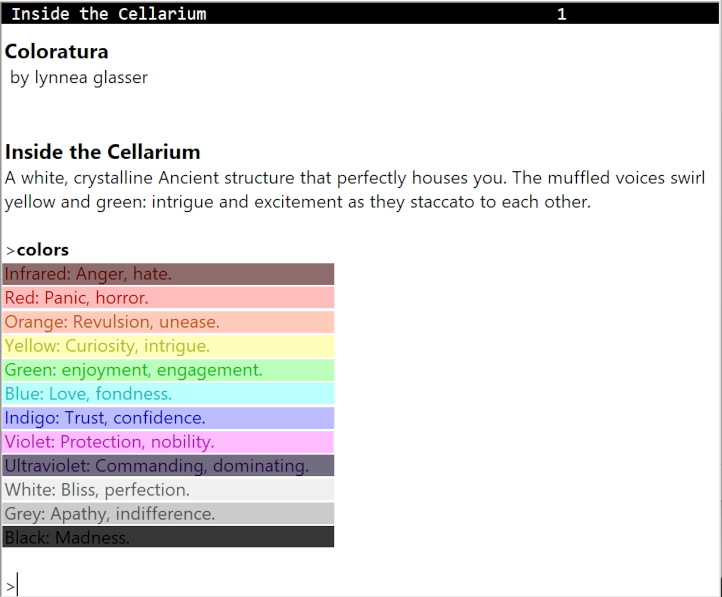
Framing emotions as colors introduced the ability to not just read minds, but to manipulate them with colors, a completely innovative and exciting format for adventure game puzzles.
Very early in the game, I give players a high-stakes, turn-limited prompt to manipulate a character who is wavering between a favorable and unfavorable color. This was a very focused and natural way of teaching the color-manipulation ability. Soon after, players get access to someone whose color can be repeatedly changed without any gameplay repercussions, allowing free exploration of the mechanic. Of course, I let players know in multiple places that the command >colors would also bring up a helpful list.
I lovingly refer to my “Best Individual Puzzle” winner as “The Meat Puzzle.” I don’t want to spoil the resolution, but I do want to talk about the structure of my design. I created a series of escalating hints that would only trigger when players interacted with the puzzle in ways that didn’t advance the solution. This created a very player-friendly way to make the puzzle feel satisfying both narratively and mechanically: players always received the exact amount of guidance without the annoyance of anything feeling too easy or too hard.
The Story of Coloratura
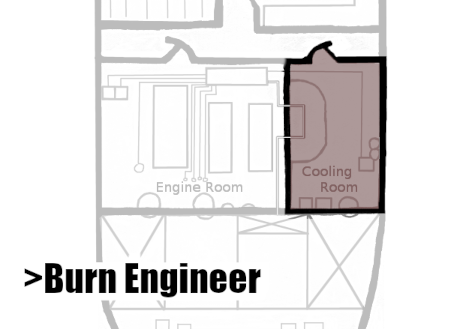
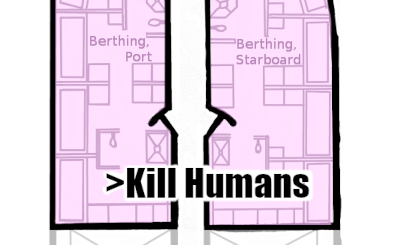
The cutting liberating, not destructive. You untether them.
White.
Peace.
One by one, their melodies harmonize; they truly connect to one another in a strong and beautiful swelling of colors. You ignite them with hope and pride.
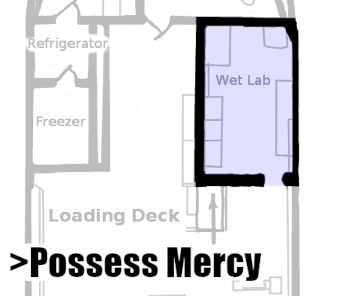
(PDF Download)
Loading Deck
Dark clouds above are dissipating, the remnants of a terrible storm. The ocean gusts are overwhelming with both their strength and their overabundance of emotion.
A metallic vesicle is secured at the south end of the deck. The messdeck is to the north, the wet lab is sectioned off to the east, and a set of stairs lead up. Your Cellarium rests here.
>go east
Wet Lab
The Mercy glows as you enter her presence. Her mind still swims with bliss, and her Song is perfectly tuned. "Thank you. I... everything is so beautiful now," she moves her body and picks you up, "I know what you want - to return," you can feel her flesh react where it touches you, "I want to help you, get you back to your home," the flesh now oozes and ashes, "as thanks for the magnificence that you have granted me," her flesh now scalds acidic, but the Mercy continues, "what should I do for you first?"
>possess mercy
The Mercy willingly gives you possession of her body, and you seat your aura within hers. Your puppeting connection causes you to eavesdrop the nerve-scream of the flesh dissolving where she is holding you in her hands. She needs to drop you.
>drop me
You drop from the Mercy as she continues, oblivious, "Listen, I know what to do. We'll use the sub. But first, please, help me fix Ruvid. He's the uh, the Drifter. I heard him, when I was called. He's split. But I saw how we could fix him." You color her mind in agreeable blue to signal accepting the terms. She brightens, then waits patiently, eager to follow you and your every command.
>go west
Loading Deck (Controlling Mercy)
Dark clouds dissipate above, while the wind pushes and pulls everything.
A metallic vesicle is secured at the south end of the deck. The messdeck is to the north, the wet lab is sectioned off to the east, and a set of stairs lead up. Your Cellarium rests here.
You toy with controlling the Mercy's body. Your chords block together as her movements and emotions perfectly follow your direction.
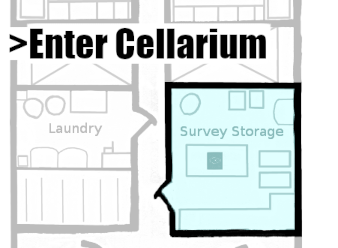
>Enter Cellarium
You crawl into the Cellarium and signal to Mercy your intent. For one last moment as your blissful tomb drifts downward, you connect with the Mercy. You Sing of aura-joinings, of unity, of perfect cohesion. You immerse, content in the Song's pattern. Spread, subduct, spread, subduct. Her mind subducts as your spreads.
I paired a unique, immersive narrative with a heavily tested puzzle design that intelligently offered hints as needed, always meeting players at their level of understanding.
Accessibility
While a visual map is included, this is a game that can be played completely blind with no loss to enjoyment. I highly recommend the parser version for anyone with visual impairment, as well as generally for the best sense of immersion.
I have also updated this game to be playable without a parser, to make it more accessible to audiences who aren't as familiar with old school text adventure commands. Both versions capture the alien unease.
Level Design
Based on real research vessels, the map was designed to feel grounded even with clear room-delineations, while also accommodating structural level design needs.
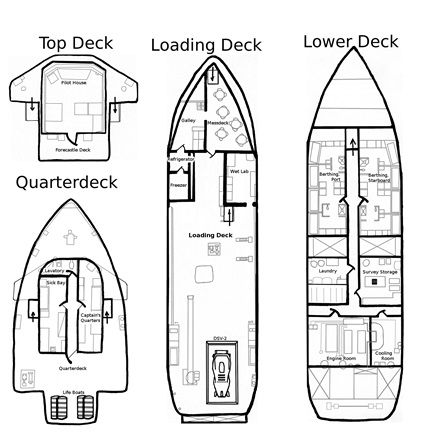
(Click to expand.)
Example: players started out in the lower level with access to only six rooms, two of which were designed as mirrors that favored whichever one players entered first. The description of the hallway between these rooms would change to help guide players to the current point-of-interest if they wandered off-path.